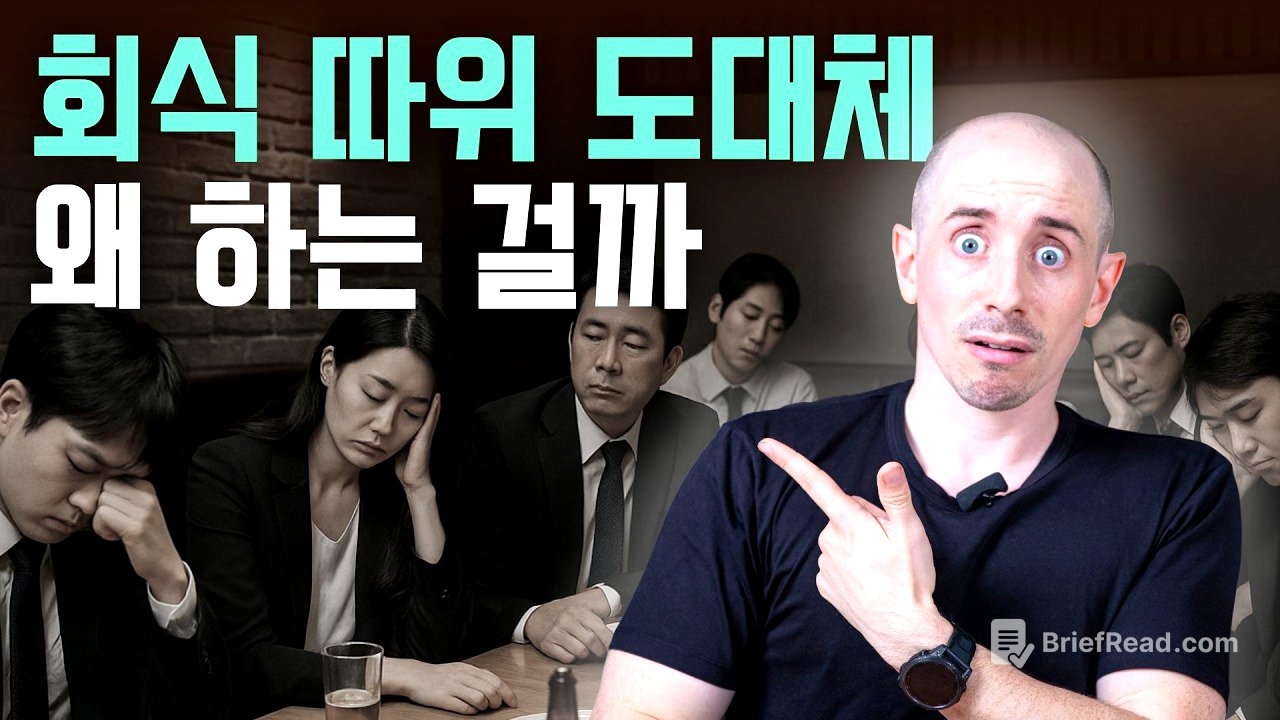TLDR;
This video explores the differences between company dinners in Korea and happy hours in the United States, arguing that these social activities are shaped by the underlying economic and labor systems of each country rather than just cultural differences. In Korea, job security and relationship-building are prioritized, leading to company dinners that reinforce internal team bonds. In contrast, the US emphasizes market value and networking, resulting in happy hours that facilitate external connections and career opportunities.
- Company dinners and happy hours serve similar social roles but are shaped by different economic environments.
- Korean company culture prioritizes job security and internal relationships.
- American work culture emphasizes market value and external networking.
Intro: The Problem of System, Not Culture? [0:00]
Tyler introduces the topic by contrasting company dinners in Korea with happy hours in the United States. He shares his initial experiences with Korean company dinners, both at the Korean Embassy in Washington D.C. and later in Korea, highlighting the emphasis on conformity and relationship-building. He contrasts this with the American happy hour, which is more about casual networking and meeting new people from various workplaces. Tyler argues that these differences are not merely cultural but are rooted in the distinct economic and labor structures of each country.
Korea's Survival Strategy: Job Security and 'Relationship Capital' [5:05]
In Korea, there's a high degree of job security, making it difficult to fire employees without a legitimate reason. This rigidity in the labor market influences HR practices, promotions, and career paths. To succeed in this environment, employees must prioritize harmony, avoid creating issues, and build strong internal relationships. Company dinners serve as a crucial platform for strengthening these relationships within teams, fostering a sense of unity and shared purpose. The practice of rotating seats during these dinners is seen as a way to evenly distribute relationship-building efforts within the group.
America's Survival Strategy: Layoff Flexibility and 'Market Value' [10:35]
The United States has a flexible labor market where layoffs are more common. Employers can terminate employees for various reasons, as long as it's not discriminatory. In this environment, employees must prioritize their market value and demonstrate their contributions to the company. Loyalty alone is not enough; individuals must focus on being helpful and continuously developing their skills to remain competitive. Happy hours in the US serve as networking opportunities, allowing individuals to build relationships outside their company and explore potential career opportunities in the broader market.
Different Definitions of Success: Promotion vs. Job Change [13:52]
Tyler addresses the common explanation that Korean culture is collectivist while American culture is individualistic, and offers a nuanced perspective based on cultural dimensions theory. He clarifies that collectivism and individualism are strategies for individuals to pursue their own interests within a given societal structure. In a collectivist society like Korea, individuals achieve their goals by acting collectively and fitting into the group. In an individualistic society like the US, individuals succeed by standing out and pursuing their own paths.
Conclusion: An 'Intellectual Eye' to Understand the System [19:35]
Tyler concludes by noting that Korean company dinner culture is evolving due to technological advancements and the rise of freelance work. He emphasizes the importance of understanding the underlying "hardware" (economic and legal structures) that shapes cultural "software" (social practices). Instead of simply attributing differences to culture, he encourages viewers to analyze the structural factors that influence how people succeed and survive in different societies.









